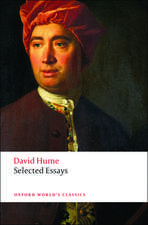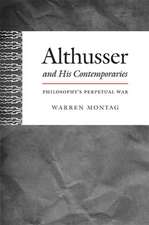Bodies, Masses, Power: Spinoza and His Contemporaries
Autor Warren Montagen Limba Engleză Hardback – 31 dec 1999
Preț: 283.32 lei
Nou
Puncte Express: 425
Preț estimativ în valută:
54.22€ • 56.13$ • 45.83£
54.22€ • 56.13$ • 45.83£
Carte tipărită la comandă
Livrare economică 01-07 martie
Preluare comenzi: 021 569.72.76
Specificații
ISBN-13: 9781859847015
ISBN-10: 1859847013
Pagini: 136
Dimensiuni: 210 x 280 x 9 mm
Greutate: 0.41 kg
Editura: VERSO
ISBN-10: 1859847013
Pagini: 136
Dimensiuni: 210 x 280 x 9 mm
Greutate: 0.41 kg
Editura: VERSO
Notă biografică
Warren Montag is Associate Professor of English at Occidental College, Los Angeles. He is the author of Bodies, Masses, Power: Spinoza and his Contemporaries and the Unthinkable Swift.
Recenzii
“The materiality of scripture, the objectivity of the regime of the mind, the naturality of the political body: such are the three themes that Warren Montag has chosen in order to open a direct path to Spinoza’s thought. I admire the clarity and intelligence with which he has been able to extract from this thought that which, even today, can speak to a readership beyond the historians of philosophy enclosed in the narrow limits of their speciality.”—Pierre Macherey
“In this beautiful book Montag suggests the possibility that Spinoza’s political ontology is capable not only of giving form to democratic power, but of giving creativity to the body of the multitude.”—Antonio Negri
“In this beautiful book Montag suggests the possibility that Spinoza’s political ontology is capable not only of giving form to democratic power, but of giving creativity to the body of the multitude.”—Antonio Negri

















